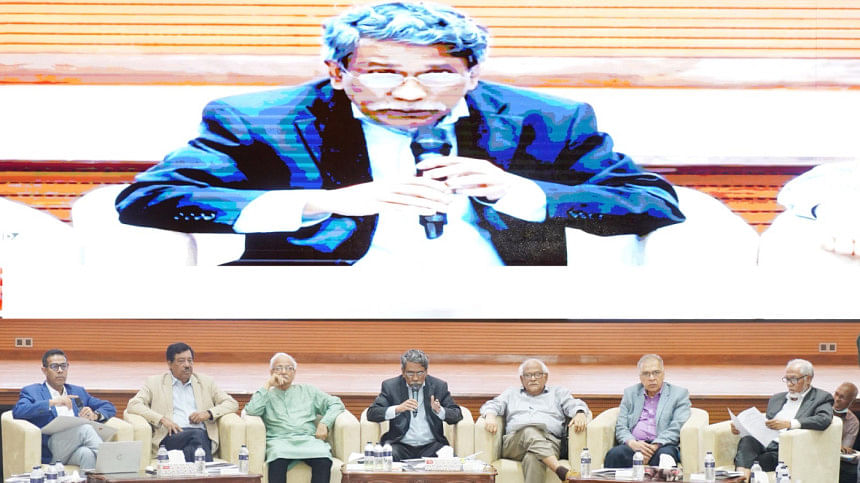Consensus talks: Commission recasts the NCC proposal, drops pluralism

The National Consensus Commission yesterday revised the structure and functions of the proposed National Constitutional Council.
It dropped "pluralism" from the proposed basic principles of the constitution as the BNP, Jamaat, and several other Islamic parties were against it.
The commission placed the revised proposals at yesterday's meeting with political parties at the Foreign Service Academy in the capital. It was the 6th day of the 2nd phase of the commission's dialogue with parties.
The proposed National Constitutional Council (NCC) has now been renamed the Committee for Appointments to Constitutional and Statutory Bodies, and it will not include the president and chief justice as members, said a member of the commission, requesting anonymity.
The changes had to be made because the BNP and like-minded parties were against giving the proposed NCC the power to appoint the chief adviser of caretaker governments, added the member.
Members of the committee will be the prime minister, speakers of both the lower and upper houses, the opposition leader, one representative from parties other than the main opposition, a president's representative whose qualifications will be determined by the law, and an Appellate Division judge nominated by the chief justice.
The speaker of the lower house will chair the committee meetings.
The Constitution Reform Commission had earlier proposed equality, human dignity, social justice, democracy, and pluralism as the basic principles of the constitution.
The revised version has now replaced pluralism with religious freedom and communal harmony.
The reform commission originally proposed that the NCC would oversee appointments to the positions of chief adviser, attorney general, chiefs of the three armed forces, and other constitutional posts.
Parties that supported that proposal maintained that the NCC would help curb the excessive concentration of executive power in the hands of the prime minister.
Under the current constitution, the president is required to act on the prime minister's advice in most appointments, except in the cases of appointing the prime minister and the chief justice. This gives the executive branch significant control over such matters.
The Committee for Appointments to Constitutional and Statutory Bodies will not oversee appointments of the chief adviser, the attorney general and the chiefs of the three armed forces.
After the consensus commission meeting yesterday, its Vice-President Prof Ali Riaz told reporters that the process to appoint the chief adviser would be discussed later.
The commission moved away from its earlier NCC framework due to the political parties' concerns.
The meeting was scheduled to discuss several matters but only the fundamental principles of the constitution and the NCC were discussed, he said.
"While some parties supported retaining the existing principles, others expressed differing views. As a result, no consensus has yet been reached," he said.
However, he noted that most parties expressed support for five principles: equality and human dignity, social justice, democracy, religious freedom and harmony, and impartiality.
BNP Standing Committee member Salahuddin Ahmed told reporters after the meeting that his party agreed in principle that an individual cannot be the prime minister for more than 10 years. "But if a body like the NCC interferes with executive functions, we will not support it. We will reject the [10-year] limit," he said.
The current laws that dictate the appointments to constitutional bodies need to be reformed, he said, proposing the formation of search committees through executive orders to ensure transparency and accountability.
"Checks and balances must come from institutional reforms, not simply by limiting the executive power."
Regarding the principles, Salahuddin said the proposals should be left for the government which would be formed after the national election to implement.
He also called for the reinstatement of certain elements from the 5th Amendment to the constitution. However, he acknowledged that consensus on these matters has not yet been achieved.
Jamaat Assistant Secretary General Maulana Rafiqul Islam Khan said most political parties agreed to the proposal that no person should serve as prime minister for more than 10 years in their lifetime.
"Except for the BNP, most parties support this proposal. Now it's up to the commission to implement it," he said.
Rafiqul further said that parties had reached a consensus on including "complete faith and trust in Almighty Allah" in the fundamental principles.
The left-leaning parties objected to it.
He welcomed the proposal bringing changes to the NCC.
"This proposal aims to safeguard the country and its people from despotic or fascist rules," he added.
Gonosamhati Andolon Chief Coordinator Zonayed Saki said no consensus had been reached regarding the fundamental principles of the state.


 For all latest news, follow The Daily Star's Google News channel.
For all latest news, follow The Daily Star's Google News channel. 



Comments